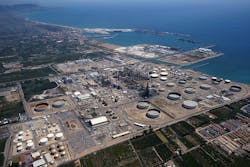bp partnering for green hydrogen project at Castellón refinery
bp plc’s bp Energía España and Iberdrola España SA have formed a 50-50 joint venture and taken final investment decision (FID) to build a grassroots plant for production of green hydrogen at bp’s 104,500-b/d refinery in Castellón, Spain.
Approved for FID in late July 2024 as part of the partners’ Castellón Green Hydrogen SL formed in late 2023, the proposed project will involve construction of a 25-Mw electrolyzer equipped to produce about 2,800 tonnes/year (tpy) of green hydrogen to substitute part of the grey hydrogen produced from natural gas currently used at the site, bp and Iberdrola said in series of separate releases between Sept. 9-12.
Scheduled to enter operation during second-half 2026, the proposed green hydrogen plant is anticipated to reduce carbon dioxide (CO2) emissions at the site by 23,000 tpy, the companies said.
To be powered by renewable electricity through a power purchase agreement (PPA) signed with Iberdrola España, which will supply 200 GWh/year coming from Iberdrola’s photovoltaic and wind projects.
The partners confirmed that Plug Power Inc. will supply five modules of its 5-Mw proprietary containerized proton exchange membrane (PEM) systems for the electrolyzer, which will electrolyze water to produce green hydrogen using only renewable electricity to ensure production complies with the European Commission’s (EC) requirements for Renewable Fuels of Non-Biological Origin (RFNBO).
As defined by the EC, RFNBOs are synthetic drop-in fuels mostly derived from electricity that can cover part of the European Union’s (EU) demand in the coming years.
Installation of the green hydrogen plant—which will be bp’s first industrial-scale project of its kind—comes as part of the operator’s broader decarbonization strategy, including its plan to transition the Castellón refinery into an integrated energy hub, the company said.
Undertaken with participation of Spain’s Instituto Tecnológico de la Energía (ITE), the proposed project has already obtained funding of €15 million from the Innovative Value Chain and Renewable Hydrogen Knowledge support programs of the Spanish Recovery, Transformation and Resilience Plan, with funds allocated by the EC-supported NextGenerationEU.
Alongside the initial 25-Mw Castellón project, bp said it also assessing future opportunities to expand green hydrogen capacity at the site with subsequent phases of the project to supply volumes to key third-party hard-to-abate users in the Valencia region, such as those in the ceramics, chemical, and heavy transport industries.
Spanish hydrogen economy
Launch of the electrolyzer project follows bp’s recent agreement with the Valencian government to reinforce the region's position as a leader in the energy transition, which has since resulted in creation of a joint working committee that will serve as a platform for dialogue and collaboration between both bp and the government to oversee bp’s transformation of the Castellón into an integrated energy hub.
Committed to achieving carbon neutrality by 2050 across global operations, bp’s unveiled the Valencian Community Hydrogen Cluster (HyVal) at its Castellón refinery that, led by bp and based on public-private collaboration, is an initiative focused on developing up to 2 GW of electrolysis capacity for green hydrogen production by 2030 to promote and encourage development of renewable hydrogen economy in Spain, according to a February 2023 release from the operator.
bp said it expects HyVal to play a key role in decarbonizing its Castellón refinery operations, the transformation of which—including the production and use of green hydrogen, biofuels, and renewables—could require a total investment of up to €2 billion.
About the Author
Robert Brelsford
Downstream Editor
Robert Brelsford joined Oil & Gas Journal in October 2013 as downstream technology editor after 8 years as a crude oil price and news reporter on spot crude transactions at the US Gulf Coast, West Coast, Canadian, and Latin American markets. He holds a BA (2000) in English from Rice University and an MS (2003) in education and social policy from Northwestern University.

